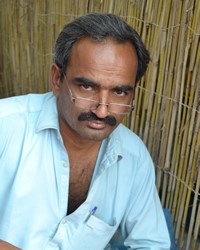Sindhi in Afghanistan

Photo Source:
Khalid Mahmood - Wikimedia
Creative Commons
|
Send Joshua Project a map of this people group.
|
| People Name: | Sindhi |
| Country: | Afghanistan |
| 10/40 Window: | Yes |
| Population: | 27,000 |
| World Population: | 528,700 |
| Primary Language: | Sindhi |
| Primary Religion: | Islam |
| Christian Adherents: | 0.08 % |
| Evangelicals: | 0.08 % |
| Scripture: | Complete Bible |
| Ministry Resources: | Yes |
| Jesus Film: | Yes |
| Audio Recordings: | Yes |
| People Cluster: | South Asia - other |
| Affinity Bloc: | South Asian Peoples |
| Progress Level: |
|
Introduction / History
The Sindhi of Afghanistan are part of a much larger Sindhi people group. This larger group is the second largest ethnic group in Pakistan. The Sindhi, named after the Sindhu (Indus) River, are also said to be one of the oldest people groups in Pakistan. Most of them have lived there for centuries and call themselves the pukka, or "real," Sindhi. Some have traced their origin back to the Arab invaders who introduced Islam to Pakistan in 711 A.D. Prior to 1947, Muslim and Hindu Sindhi lived together in the same region. Today, however, most of the Hindu Sindhi live in India and most of the Muslim Sindhi live in Pakistan, but a smaller number of these Muslims spilled over into neighboring Afghanistan. Other Sindhi are scattered all over the world, from the oil fields of Oman to the business centers of Hong Kong and Singapore. These are the fortunate few; most of the Muslim Sindhis who remain in their Pakistani and Afghan homeland are less prosperous.
What Are Their Lives Like?
Today, a majority of the Sindhi in Afghanistan are engaged in irrigation farming. Their principal crops include wheat, rice, cotton, sugarcane, various fruits, and oilseed. Some farmers also raise sheep, goats and camels. The Sindhi living in cities often work as merchants, physicians, lawyers, and teachers. Those in rural areas abide in mud or baked-brick houses built close together for protection. Even very small homes are surrounded by high walls. The houses are designed so that male guests never see the women.
The family is the basic unity of Sindhi society, with the male head being the authority. Generally, Muslim Sindhi women stay home, leaving only for special occasions such as visiting the temple or calling on relatives. They wear long black dresses and cover their faces with heavy veils. The Sindhi traditionally do not marry outside of their own social classes. They prefer marriages between first cousins, and long engagements are common. The wedding ceremony includes a reading from the Koran and is performed by a local Muslim teacher.
The Sindhis in Afghanistan hold many of their own festivals in a given year. They celebrate with singing, dancing and reading poetry.
What Are Their Beliefs?
Most of the Sindhi in Afghanistan are Muslim. The majority of the rural Sindhi, however, have no clear understanding of their Muslim faith and still believe in "folk spirits." Before 1947, many Hindu and Muslim practices were combined. For example, it was not uncommon for both Hindus and Muslims to venerate the same saint. Today, the practice of saint worship still persists. There are also Sufi shrines in Sindhi communities. Two religious ceremonies are closely related to birth: naming the child and shaving its head. At the naming ceremony, the father whispers, "Allah is great," into the child's ear so that Allah's name is the first thing the child hears. The head-shaving ceremony seems to be a symbolic act of sacrifice. The young child's head is shaved, and the hair is buried along with the bones of a sacrificed goat.
What Are Their Needs?
The Muslim Sindhis need the chance to put all their trust in Jesus Christ, sent by the Living God to bless all nations. They also need abundant rain for their crops so they can have an adequate harvest.
Prayer Points
Pray for abundant rain so the Sindhis can have an abundant harvest as a testimony of God's mercy and power.
Pray for the gift of faith to come to Muslim Sindhi family and community leaders so they can open the door for a movement to Christ.
Pray for peace in Afghanistan so ideas can flow freely in this volatile region.
Pray for the Lord to thrust out Holy Spirit anointed workers to the Muslim Sindhis in Afghanistan.